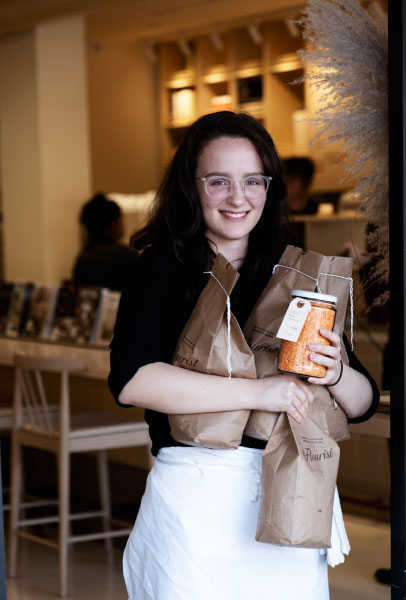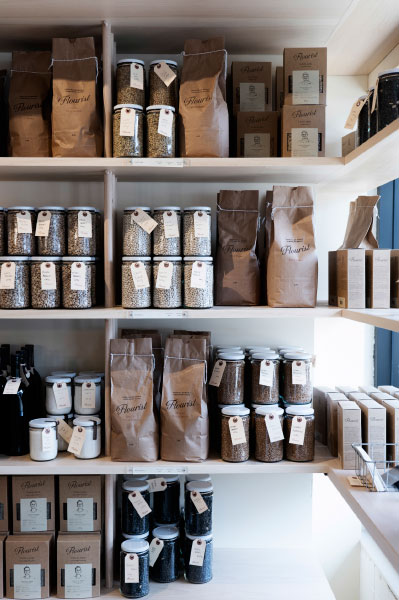Flourist mills up bouquet of fresh grains and breads
Words Gail Johnson X Photos by Lia Crowe

These days, more and more people want to know where their food comes from. Yet while we tend to seek out the source of foods like vegetables, fruit, poultry and meat, it’s less likely we can say the same of grains, beans and flours.
Flourist aims to fundamentally change the way we see and value these kitchen staples.
Operated by friends and business partners Shira McDermott and Janna Bishop, the Vancouver company is the country’s only source of fully traceable dry goods. Think chickpeas, lentils, farro, quinoa and the like grown by farmers in Alberta, Saskatchewan and Manitoba. Those farmers have names and faces, which are featured on Flourist’s products and websites.
Then there’s its flour. Made of whole grains such as red fife, rye, einkorn and spelt, it’s all freshly milled on-site in a hand-crafted mill from East Tyrol, Austria made of stone and wood.
This isn’t the flour you find on grocery-store shelves. And you can see that beautiful pine mill in use at Flourist’s recently opened East Vancouver bakery. Even the decor reflects the purity of whole-grain flour, the bright space awash in hues of ivory and blond wood.
You can get flour and loaves (like multigrain, olive, heritage boule and baguette — all sourdough) to go. There’s a retail section where you can pick up Kabuli chickpeas, French red lentils and other premium dry goods to take home. Or you can stay for a while and sit down for coffee and a cookie, sweet or savoury sourdough toast, colourful bowls abundant in seasonal veggies and prairie legumes, and more.
“We really see this as a community space dedicated to this new movement around better ingredients, fresher flour and sourdough breads,” Shira says. “We don’t use any white flour here. We wanted a space where people could actually taste the difference freshly milled organic grains make. The best way to showcase the flour was with food people could eat, and we didn’t want to stop just with bread.”
Adds Janna: “We wanted a community gathering place, and you can’t have that without having great bread, salads and pastries. This is the kind of food we like to eat.”
They first launched their venture as GRAIN, after Janna mentioned to Shira that her stepdad is a Saskatchewan farmer who grows chickpeas, lentils and wheat. That piqued Shira’s interest; she’s a health-conscious vegetarian who had never known anyone who grew those products. Plus, most of Canada’s wheat is exported. Those Italian spaghetti noodles you have at home? Chances are they were made with Canadian durum. The pair first began supplying legumes, then added freshly milled flour to their product line.
Bread and flour have been vilified over the years, with the low-carb diet and books like Wheat Belly soaring in popularity. What people may not realize is that your standard grocery-store flour is one of the most heavily processed foods that exist.
For the product to be able to stay on shelves for long periods, industrial flour producers remove portions of the grain that could lead to rancidity, specifically the germ. But it’s the germ that contains all sorts of nutrients, such as B vitamins, anti-oxidants and unsaturated fatty acids.
Plus, commercial flour producers in Canada are allowed to use “bleaching, maturing or dough-conditioning agents” like benzoyl peroxide and ammonium persulfate in their production process.
With a stone mill, grain kernels are ground slowly and at low temperatures to maintain their integrity and nutrients. Many people find that pure, freshly milled flour is easier to digest than the all-purpose, processed flour.
Flourist mills flour fresh to order, and suggests storing it in the fridge for up to six months.

“Grain historically has been traded internationally like a commodity, the same way diamonds and oil are traded, but they make up so much of our diets that they should be really treated like the source that they are,” Janna says. “This is a food that deserves to be treated with respect, and you’ll benefit from that.”
In keeping with its values of traceability and quality, Flourist favours small producers, sourcing ingredients from local outfits like Cropthorne Farm and Klippers Organic Acres. Honey and hazelnuts come from Chilliwack; direct trade coffee is from 49th Parallel Coffee Roasters. East Van Roasters, a social enterprise and bean-to-bar chocolate maker, supplies a custom chocolate for its classic chocolate chip cookie, made with sifted red fife flour.
For a real treat, grab a galette. The buttery, hand-held pie comes in sweet and savoury versions. Potato-cheddar is always on the menu; savoury varieties include squash, celeriac, cabbage and mushrooms, while sweeter styles showcase seasonal fruit and hazelnut frangipane. Look for special breads on weekends, such as chocolate cherry or potato, cheese and rosemary.
You can sign up for sourdough bread-making classes at the bakery or pick up a sourdough starter to make your own at home. (Shira’s starter is named Lucille.)
With this newer addition to Vancouver’s food scene, breaking bread has never seemed so right.
Flourist is located at 3433 Commercial Drive in Vancouver.

 A Hobby Renaissance
A Hobby Renaissance